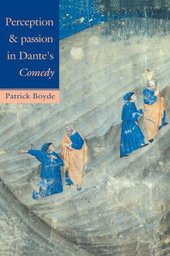
|
Perception and Passion in Dante's Comedy
Paperback / softback
Main Details
| Title |
Perception and Passion in Dante's Comedy
|
| Authors and Contributors |
By (author) Patrick Boyde
|
| Physical Properties |
| Format:Paperback / softback | | Pages:364 | | Dimensions(mm): Height 228,Width 152 |
|
| Category/Genre | Literary studies - classical, early and medieval |
|---|
| ISBN/Barcode |
9780521028554
|
| Classifications | Dewey:851.1 |
|---|
| Audience | | Professional & Vocational | | Tertiary Education (US: College) | |
|---|
| Illustrations |
Worked examples or Exercises
|
|
Publishing Details |
| Publisher |
Cambridge University Press
|
| Imprint |
Cambridge University Press
|
| Publication Date |
2 November 2006 |
| Publication Country |
United Kingdom
|
Description
Patrick Boyde argues that the way in which Dante represents what he (or his fictional self) saw and felt was profoundly influenced by the thirteenth-century science of psychology. Professor Boyde offers an authoritative account of the way in which vision and the emotions were understood in Dante's lifetime, and rereads many of the most dramatic and moving episodes in the Comedy, throwing light on Dante's narrative technique. Seeing and feeling were known to be inextricably bound up with thinking and voluntary action, and were treated as special cases of motion and motive forces. Dante's treatment of perception and passion is set in the context of Aristotelian epistemology, ethics and physics. In these areas too a knowledge of Dante's philosophical ideas is shown to illuminate his poetic representation of mental processes and value judgements, and the meaning of his journey towards the source of goodness and truth.
Reviews"...in it we are allowed to watch an elegant and graceful explicator at work, a truly learned and inventive reader who manages--mirabile dictu!--to make Aristotle jump right off the page at you. As a review of basic Scholastic terminology and theory, as a 'handbook' of philosophical backgrounds to the Commedia, and as an example of source scholarship at its very best, this is a book that every Dantist should read." Paul Spillenger, Speculum
|